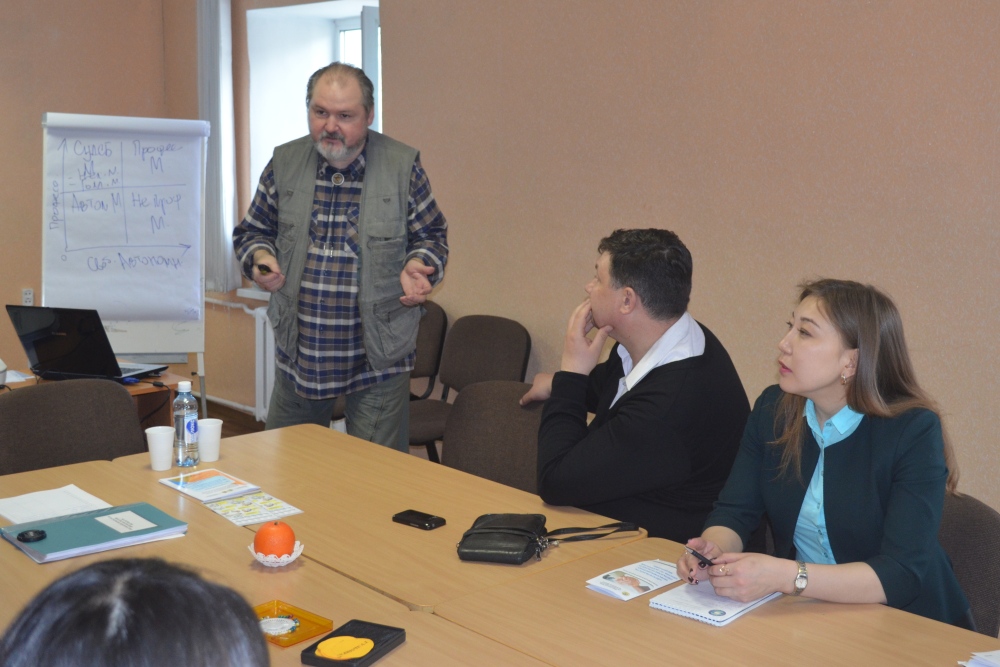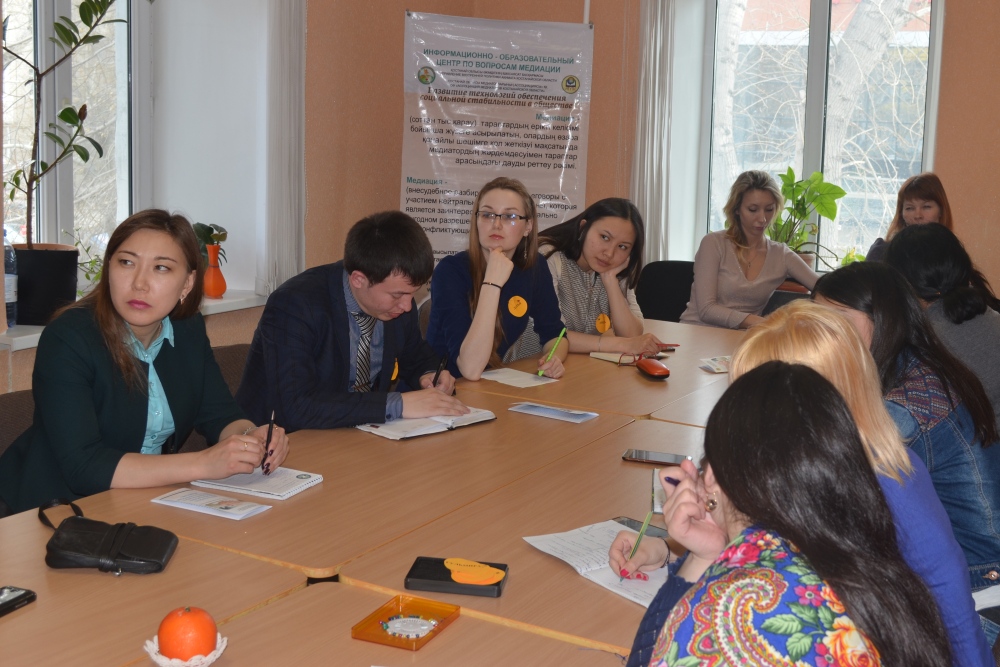
Professional mediation is on the service of society
- Details
- Published: 13 April 2017

On April 13, 2017, there took place exit occupation of the School of mediation and national diplomacy of the department of the Assembly of the people of Kazakhstan KSPI in Association of mediators of the Kostanay region (APK). The purpose is to study the experience of APK in the preparation of professional mediators, to fix theoretical knowledge of mediation, of the legislative and legal base in the sphere of mediation and documentation of the mediate process. Guests were welcomed by employees of APK: the president of APK, a mediator Bogatyrev Sergey Alekseevich, the psychologist, the trainer mediator Zuev Igor Aleksandrovich, the practicing lawyer Sobolev Vadim Nikolaevich. Students of the school of mediation, and also teachers of institute participated: S. V. Samarkin – the dean of the faculty of additional education, O. N. Evdokimova –the manager of the department of Assembly of the people of Kazakhstan, M. M. Kozybayeva is the doctor of Ph.D., the associate professor of the Assembly of the people of Kazakhstan, and also KSU mediators “Қоғамдық келісім " – Olga Kravchenko and Marina Navoyeva.
The president of APK S.A Bogatyrev noted that the Association carries out the preparation of the professional and nonprofessional mediators, renders assistance in identification and registrations of local executive bodies of nonprofessional mediators, provides public hearings, training and so forth.
Recently the great value is gained by preparation of professional and nonprofessional (national) mediators in areas of the Kostanay region mainly by the state order for the purpose of registration in bodies of the local executive authority. As organizers explained, in mediation existence of the higher education, and also the age qualification is of great importance: so to become a professional mediator achievement of the age of 25 years, nonprofessional (national) – is necessary 40 years though recently the question of decrease in this indicator up to 30 years is discussed. Differences professional from a nonprofessional mediator consist, first of all, available at the professional of the special certificate on passing of courses of preparation when the national mediator is chosen the population of a certain region owing to the personal characteristics and wide life experience, and also in implementation of activity on a paid or gratuitous basis. Mediators are designed to unload courts from a large number of claims, first of all, for civil cases, and also promote restoration of normal climate in public communications.
Trainer mediator I. A. Zuev noted that in meditative practice use of achievements of psychology and law which would consider features of public communications is of great importance. Therefore the meeting began with an acquaintance in the form of a training "Snowball" that allowed all participants to get acquainted and recognize each other. During the meeting lecturers told about essential differences of mediation from other ways of resolution of conflicts, about the main stages of escalation of the conflicts for definition of a possibility of implementation of mediation, types of mediation, the principles and the main stages of mediation process, the main types of documents (the contract and the agreement) accompanying this type of extrajudicial trial were studied.
The lawyer V. N. Sobolev noted that mediation process differs radically from the voluntary settlement which is possible during judicial proceedings. Besides, by means of mediation practically any conflicts, except the criminal cases and the conflicts menacing to a homeland security can be resolved. Therefore mediation is called most often extrajudicial trial, and it is wrong to call it a pre-judicial form of resolution of conflicts.
Lecturers drew great attention to the basic principles of mediation extended to all three parties – participants of process (a mediator and conflicting parties): voluntariness, equality, independence and impartiality of a mediator, non-interference to the procedure of the third parties, confidentiality. Also interesting facts from practical activities in mediation were noted: about possibility of carrying out process of mediation if necessary two mediators for an exception of gender and international barriers in reconciliation of the parties.
The meeting had educational and practical and informative character: striking examples from practical work of Association were given, possible errors of the beginning mediators are sorted, tendencies in the implementation of concrete medications are revealed, practical recommendations are made. Lecturers gave detailed answers to questions of listeners; the meeting was followed by an interesting discussion. Listeners and teachers of the School of mediation and national diplomacy of KSPI expressed words of gratitude to employees of APK, and also hope for further cooperation in the course of preparation of the mediators.





